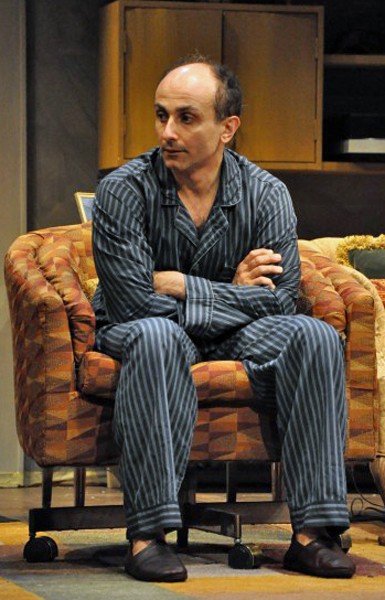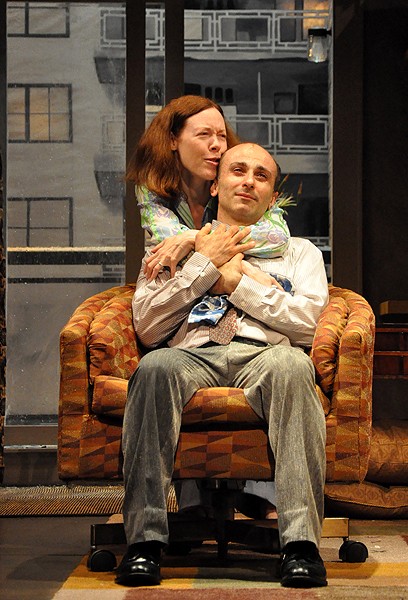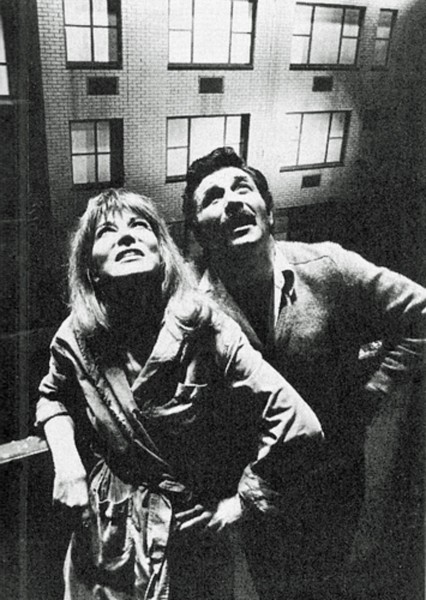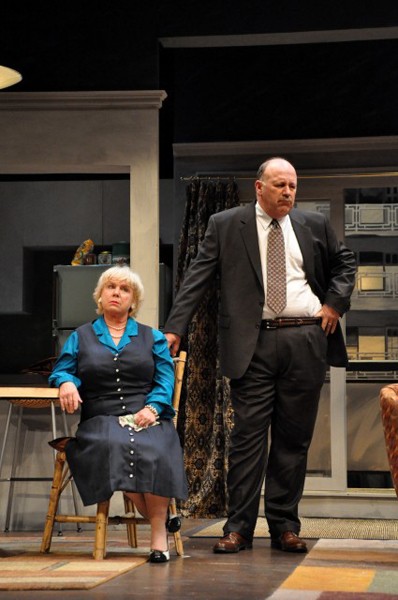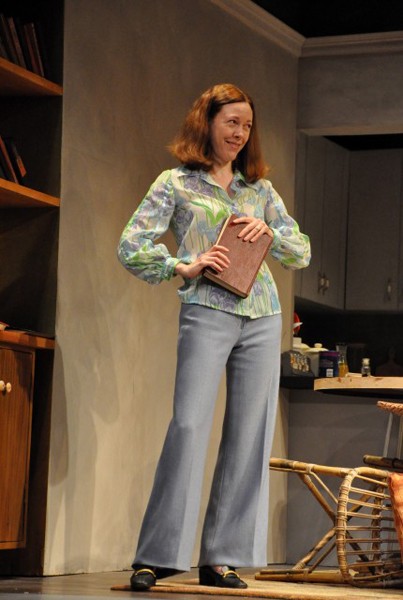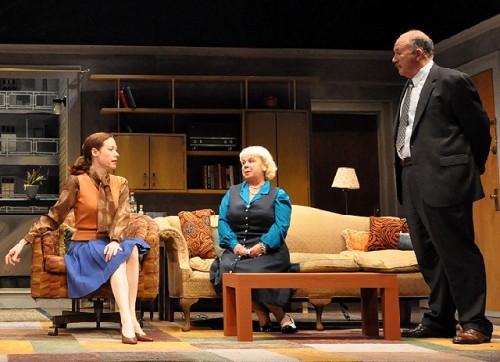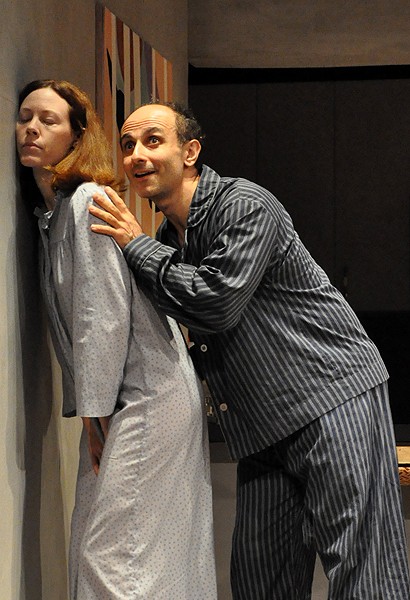Captivating Prisoner of Second Avenue at Berkshire Theatre Festival
Neil Simon's Play Pokes Fun at the Seventies
By: Larry Murray - Jul 26, 2009
The Prisoner of Second Avenue by Neil Simon, Directed by Warner Shook with Veanne Cox at Edna Edison, Stephen DeRosa as Mel Edison, Denny Dillon as Jessie, Julian Gamble as Harry Edison, Jeanne Paulsen as Pauline, Alice Payten as Pearl. Stage Manager, Stephen Horton; Scenic Designer, Scott Bradley; Costume Designer, Laurie Churba Kohn; Lighting Designer, Mary Louise Geiger; Resident Composer/Sound Designer, Scott Killian; Assistant to the Director, Vicki Schairer. July 21 - August 9, 2009 at the Main Stage, Berkshire Theatre Festival, Stockbridge, MA. Two hours plus one fifteen minute intermission. http://www.berkshiretheatre.org/
Neil Simon is the playwright who more than any other sorted it all out for us. His body of plays and movies can either be seen as a treasure trove of wit and satire, or as one of the most insightful storehouses of information on our culture. Watching The Prisoner of Second Avenue last night at the Berkshire Theatre Festival, it became clear that his works document the rapid changes that occurred between the late '60s and the '90s that saw Americans drop their preoccupation with conforming, and evolve in the opposite direction, towards independence and non-conformity. It's been quite a trip.If you use Simon as your guide, it is a hilarious evolution as well, the only requirement being the ability to laugh at yourself. Back in the late '60s it seems just about all of us were "neurotic" just as half a century before many suffered from "hysteria" or whatever common terms were employed to describe those who were terribly unhappy and functioning poorly.
In Prisoner, Mel Edison (Steven DeRosa) loses his job but is too ashamed to tell his wife, so instead he "acts out" at 2:30 in the morning, complaining about the air conditioner, the neighbors, the dogs barking, and assorted other minor issues rather than dealing with the truth. Of course, this is all absolutely hysterical. Insult follows indignity and he works himself into a lather. He ends up standing on his terrace - an out of control hothead yelling at full voice at an upstairs neighbor. In due course, a bucket of cold water is dumped on him from above.
His implacable wife, Edna Edison (Veanne Cox), ever supportive, helps dry him off, all the time maintaining a tight reign on her feelings to provide him support. She is a model of patience, understanding and perfection, the ideal in those days. Several days later, after their apartment is robbed, she begins to have her own meltdown. That is until she learns of his joblessness and suddenly the roles are reversed. She becomes the breadwinner while he feels worthless and falls into a deep funk. He is having what they call a nervous breakdown. This momentary paralysis and depression call for immediate psychiatric intervention at a time when they can least afford it. The play mines these feelings for both laughs and insights, and soon things become more complicated.
When Mel's brother Harry (Julian Gamble) and three sisters, Jessie (Denny Dillon), Pauline (Jeanne Paulsen), and Pearl (Alice Payten), come to visit to see how they can help, the pre-feminist days of sexism are clear for all to see. The sisters and brother are unable to converse normally about Mel's problem, launching into metaphors and cloaked references in order to try to sort out the situation and help. Meanwhile Edna the wife, rebuffs their offer to pay for a shrink, insisting she can manage without their help. Soon however, she is suggesting a loan to help them open a summer camp business. This, she explains, will provide Mel with work to bring him out of his depression. During this scene, Denny Dillon as Jessie is absolutely hilarious, playing brilliantly off of Julian Gamble as Harry.
The discussion is conducted with the utmost seriousness, while the audience is cracking up with the silliness of it all. The more serious the siblings take themselves, the more hilarious the encounter becomes. That period of time, in the early years of the counter-culture, was ripe for lampooning. Simon is not the only one who found humor in all the hypocrotic pretensions while the real travesties of those days - war, racism, sexism, poverty and homophobia - were swept under the rug. Simon gets the balance exactly right, and caricatures our righteous huffing and puffing brilliantly.
From an audience standpoint, it is impossible to think of a more popular playwright. With more than thirty plays (including contributions to musicals such as Sweet Charity) he has connected with both the public and academia over his long career in both theatre and film. Simon has an honoris causa degree as Doctor of Laws from Williams College and a Broadway theatre named after him. As to the Williams degree, he dismisses it with one of his most famous quotes: "Would you let an honorary mechanic fix your brand-new Mercedes?"
In other plays he works the subjects of leaving home (Come Blow Your Horn) gays in the military (Biloxi Blues), relationships (Odd Couple), old age (Sunshine Boys) and in Prisoner of Second Avenue, the threat of aging to one's sense of self worth and the decay of modern society. In all his plays, as in our own lives, it is the relationships that are most important. This is why he connects with audiences.
Warner Shook makes an auspicious BTF directorial debut with this play. Kate Maguire, the company's Artistic Director has cultivated a clever cadre of creatives over the years, and clearly Shook will fit right in. The play moved right along, building from a gentle, almost abstract start, to several peaks of emotion and energy. At one point Veanne Cox as Edna was throwing furniture and books around, the next tidying up, all the while totally flustered at the invasion of their home by a robber. The brilliant Stephen DeRosa had a spellbinding moment when he was up, on, and over the sofa and other furniture as he ranted and raged against imagined enemies.
The set itself was a clever combination of utility and uniqueness, with sliding door panels that would effortlessly slide open and closed in a flash, like some giant game show set. There were brief projections and news blurbs to fill in the moments for resetting the stage. No men in black here. Surround sound special effects filled the theatre as well, creating a cacophony of harsh city sounds to suggest living (and trying to sleep) on the edge of madness.
The Prisoner of Second Avenue is a laugh filled evening of fun and a real belly tickler. You'll love meeting Mel and Edna despite their problems. Their adversity is so over the top that you can't help but laugh uncontrollably at their attempted solutions. Their predicaments are familiar, their answers less than perfect. But through it all they hang in there.
It's funny how losing a job and home are the same threats today as they were 38 years ago when Simon wrote his play. Back then, the recessions were less severe, and jobs were just beginning to move offshore. Dealing with joblessness and reduced income is no easier today, though we no longer need consider ourselves prisoners of our situation. We are not tied to outdated roles and customs to the same extent that we were almost forty years ago.
Perhaps the most important lesson from this play is that even if trouble piles on trouble, it is best to face it together. No matter how bad things get in Prisoner, no thought is given to breaking up. In the end, it is their less than perfect relationship that sustains them.
It's an interesting concept coming from Neil Simon who has been married five times; to dancer Joan Baim (1953-1973), actress Marsha Mason (1973-1981), twice to Diane Lander (1987-1988 and 1990-1998), and currently actress Elaine Joyce. He is the father of Nancy and Ellen, from his first marriage, and Bryn, Lander's daughter from a previous relationship whom he adopted. Perhaps experience is the best teacher.
http://www.berkshiretheatre.org/


